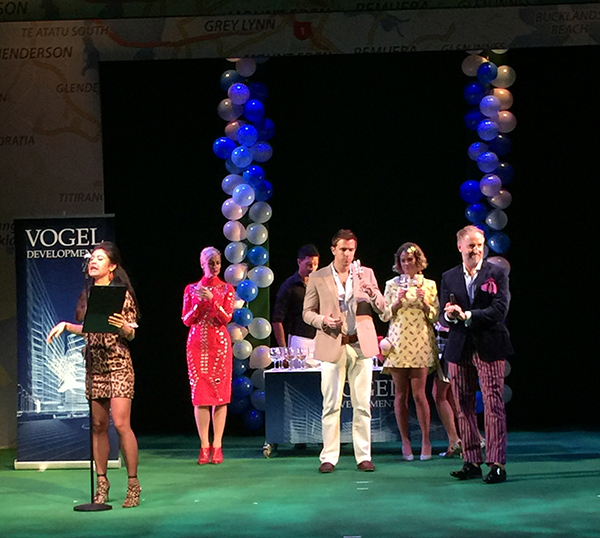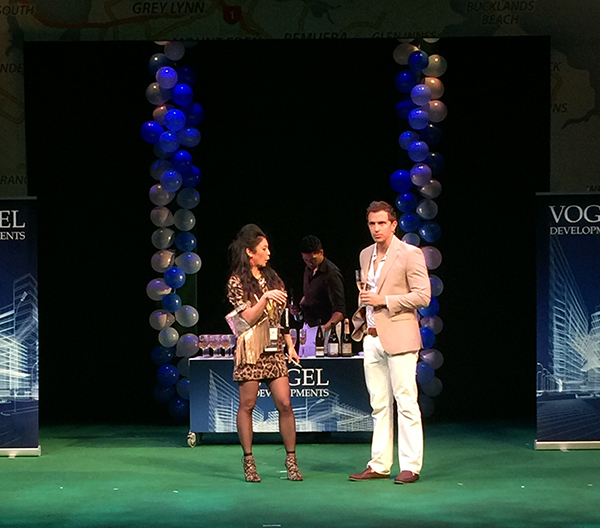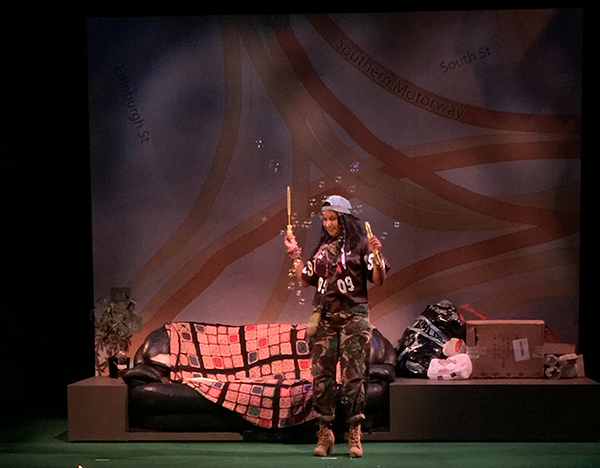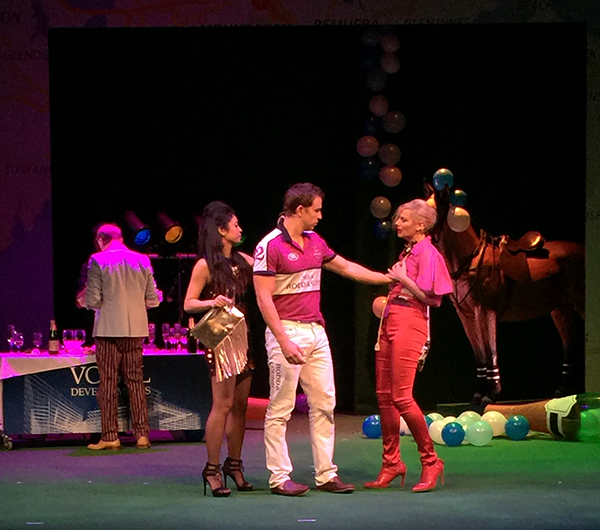POLO
By Dean Parker
Directed by Colin McColl
Auckland Theatre Company
SKY Theatre, Auckland February 13- March 5 2016
Reviewed by Nik Smythe, Theatreview 14 Feb 2016
Image Credits: Lucy Jane Senior

This world premiere of celebrated Kiwi playwright Dean Parker's new play is a would-be socio-political minefield, taking aim at New Zealand's contemptuous and contemptible aristocracy on their own turf – the Clevedon Polo club, to be precise.
The roll-call representing the upper echelons of Auckland's elite begins with Lisa Chappell as Gillian Hancock, ambitious Tory MP for Clevedon, dressed defiantly in red if only to break up the Labour party's perceived (and ironic) monopoly on the colour. Her high-rolling property developing husband Mungo (Adam Gardiner) is your conventional hard-nosed capitalist bully, perpetually accentuating the positive and denying the negative.
There's tension between the power-couple at the outset, due to the (unseen) journo bent on exposing Mungo for using his wife's political clout to further his dodgy off-shore construction agenda, posing a tangible threat to her own career.
Hannah Peterson is the Hancocks' pretty daughter Harper, a poor little rich girl with idealistic notions of ‘becoming a creative'. Her limited personality is augmented by the uncompromising cheek of her hilarious best friend Annabel (Katrina Wesseling), and her affably clumsy boyfriend Kerrisk (Taylor Barrett), also Annabel's brother. All three youngsters struggle in different ways to feel a part of their exclusive clique, or indeed find a place where they think they could belong.
 Harry McNaughton's visiting South African corporate-team captain Jaap at first seems as clichéd as they come, with his blunt accent and amusing foreign turns of phrase, however he has more than one secret to reveal before the story ends. Meanwhile event organiser Sally Hunt (JJ Fong) is your classic pretentious rags-to-riches case, revelling in the decadence of a life denied her when growing up, as belied by her overbearingly caustic tone of voice.
James Maeva's role as Matiu the waiter is pivotal, transcending this unattainable grandeur and the ‘real world' of his cheap flat in Eden Terrace. He has a gentle, almost sage demeanour that's more relaxed and self-assured than anyone else in the story.
Unemployed teen Amber (Kalyani Nagarajan) is as flighty and effusive as her flatmate Matiu is calm and collected. She clearly enjoys her life and dreams of magnificent adventures she doesn't really expect to ever actually have. Probably the most intellectual character, her geographical knowledge, both local and global, is formidable, as are her penetrating insights to the human condition, framed in a wholly poetic turn of phrase.
John Parker's innovative set is framed by a magnified road-map of greater Auckland, inside which the green-floored pavilion is decked out with chairs, tables, balloons and those crass giant blow-up bubbly bottles. A mobile, more specific map details the ‘iron triangle' between the Newton Bridge, Eden Terrace and Ian McKinnon Drive: the backdrop to Matiu and Amber's modest digs.
Costume designer Lucy Jane Senior has evidently had a field day of her own, sourcing the fancy fun frocks and other ostentatious apparel to adorn the privileged classes, in contrast to the perfunctory attire of the hospitality staff (Matiu) and sportsmen (Jaap). Amber's wardrobe is the most distinct, with op-shop combinations giving her a purposefully tribal appearance.
Harry McNaughton's visiting South African corporate-team captain Jaap at first seems as clichéd as they come, with his blunt accent and amusing foreign turns of phrase, however he has more than one secret to reveal before the story ends. Meanwhile event organiser Sally Hunt (JJ Fong) is your classic pretentious rags-to-riches case, revelling in the decadence of a life denied her when growing up, as belied by her overbearingly caustic tone of voice.
James Maeva's role as Matiu the waiter is pivotal, transcending this unattainable grandeur and the ‘real world' of his cheap flat in Eden Terrace. He has a gentle, almost sage demeanour that's more relaxed and self-assured than anyone else in the story.
Unemployed teen Amber (Kalyani Nagarajan) is as flighty and effusive as her flatmate Matiu is calm and collected. She clearly enjoys her life and dreams of magnificent adventures she doesn't really expect to ever actually have. Probably the most intellectual character, her geographical knowledge, both local and global, is formidable, as are her penetrating insights to the human condition, framed in a wholly poetic turn of phrase.
John Parker's innovative set is framed by a magnified road-map of greater Auckland, inside which the green-floored pavilion is decked out with chairs, tables, balloons and those crass giant blow-up bubbly bottles. A mobile, more specific map details the ‘iron triangle' between the Newton Bridge, Eden Terrace and Ian McKinnon Drive: the backdrop to Matiu and Amber's modest digs.
Costume designer Lucy Jane Senior has evidently had a field day of her own, sourcing the fancy fun frocks and other ostentatious apparel to adorn the privileged classes, in contrast to the perfunctory attire of the hospitality staff (Matiu) and sportsmen (Jaap). Amber's wardrobe is the most distinct, with op-shop combinations giving her a purposefully tribal appearance.
 A large model horse provides an amusing surreal evocation of the otherwise unseen equine creatures, without which these events could not take place, and there seems to be no small degree of corporate sponsorship on display with the props and costumes, not to mention in the dialogue.
Loaded with character stereotypes, some of which are subverted in play while others remain constant, Parker's script is all quite clever, even poignant on a cerebral level, yet lacking any real sympathy. Some are likeable but none of them could break your heart. Some are seen to have epiphanies but we're not at all involved enough to share them. There is plenty of wit and a couple of twists, but nothing really surprising on reflection.
It seems a challenge in itself to provide the audience with a crash-course in the titular game, which probably about 99 per cent of us have no real affinity with. It's not as widely relatable as, say, rugby or cricket. Even sailing, generally agreed to be a rich mans' pastime, is still recognised and enjoyed by the hoi-polloi, whereas all I really know about Polo, going in, is that it's something like field hockey with horses, and is as much about the ladies' hats and frocks as the game.
A dummy's guide in the programme provides a little more understanding, as does Jaap's spirited recounting of the day's play at the start of the second half. Overall though, it doesn't engender an empathetic connection like perhaps an American baseball movie might. Perhaps it's simply the nature of the sport and its class of supercilious participants and patrons – or maybe it's just because the game isn't played on television.
Assuming this disconnection is an accurate detail, it does nothing for the dramatic tension required to affect an audience. Of course, it's really not about the game specifically so much as it's about politics and relationships and ultimately people. Again, I feel almost denied access to the real inner truths of any of them – even the forthright, candid Amber is effectively so mercurial that we can't really get to know her.
Nevertheless, it's never actually painful or boring, thanks largely to a liberal (no pun intended) seasoning of satirical jibes, cultural references and celebrity name-dropping. And as much as the script could warrant further development, Colin McColl's direction often feels hurried so as to accommodate everyone's innate verbosity, with little room to breathe. This only adds to the divide between the players and the audience, and we're ultimately left wanting for a clear idea of the actual intention and/or point of the whole enterprise.
It is worth noting that, being a world premiere of a brand new play with an unorthodox setting, a certain amount of greenness is probably inevitable. As the actors wear their roles in during the season, it's conceivable they may develop more layers to their interactions as they discover the boundaries of the work's potential scope.
A large model horse provides an amusing surreal evocation of the otherwise unseen equine creatures, without which these events could not take place, and there seems to be no small degree of corporate sponsorship on display with the props and costumes, not to mention in the dialogue.
Loaded with character stereotypes, some of which are subverted in play while others remain constant, Parker's script is all quite clever, even poignant on a cerebral level, yet lacking any real sympathy. Some are likeable but none of them could break your heart. Some are seen to have epiphanies but we're not at all involved enough to share them. There is plenty of wit and a couple of twists, but nothing really surprising on reflection.
It seems a challenge in itself to provide the audience with a crash-course in the titular game, which probably about 99 per cent of us have no real affinity with. It's not as widely relatable as, say, rugby or cricket. Even sailing, generally agreed to be a rich mans' pastime, is still recognised and enjoyed by the hoi-polloi, whereas all I really know about Polo, going in, is that it's something like field hockey with horses, and is as much about the ladies' hats and frocks as the game.
A dummy's guide in the programme provides a little more understanding, as does Jaap's spirited recounting of the day's play at the start of the second half. Overall though, it doesn't engender an empathetic connection like perhaps an American baseball movie might. Perhaps it's simply the nature of the sport and its class of supercilious participants and patrons – or maybe it's just because the game isn't played on television.
Assuming this disconnection is an accurate detail, it does nothing for the dramatic tension required to affect an audience. Of course, it's really not about the game specifically so much as it's about politics and relationships and ultimately people. Again, I feel almost denied access to the real inner truths of any of them – even the forthright, candid Amber is effectively so mercurial that we can't really get to know her.
Nevertheless, it's never actually painful or boring, thanks largely to a liberal (no pun intended) seasoning of satirical jibes, cultural references and celebrity name-dropping. And as much as the script could warrant further development, Colin McColl's direction often feels hurried so as to accommodate everyone's innate verbosity, with little room to breathe. This only adds to the divide between the players and the audience, and we're ultimately left wanting for a clear idea of the actual intention and/or point of the whole enterprise.
It is worth noting that, being a world premiere of a brand new play with an unorthodox setting, a certain amount of greenness is probably inevitable. As the actors wear their roles in during the season, it's conceivable they may develop more layers to their interactions as they discover the boundaries of the work's potential scope.
 The biggest hindrance to achieving that is the venue: the deep-stage proscenium and the mic'd-up players once again create more distance, whereas a more intimate staging would help close that gap and humanise the characters.
[Polo was scheduled to play in the Maidment theatre until it was pronounced an earthquake risk in January and closed; hence the last-minute shift to Sky City.-ed]
The biggest hindrance to achieving that is the venue: the deep-stage proscenium and the mic'd-up players once again create more distance, whereas a more intimate staging would help close that gap and humanise the characters.
[Polo was scheduled to play in the Maidment theatre until it was pronounced an earthquake risk in January and closed; hence the last-minute shift to Sky City.-ed]